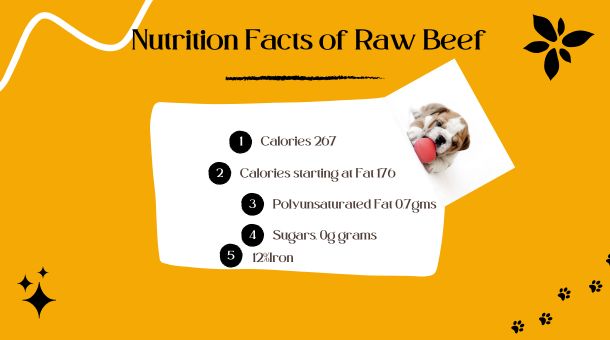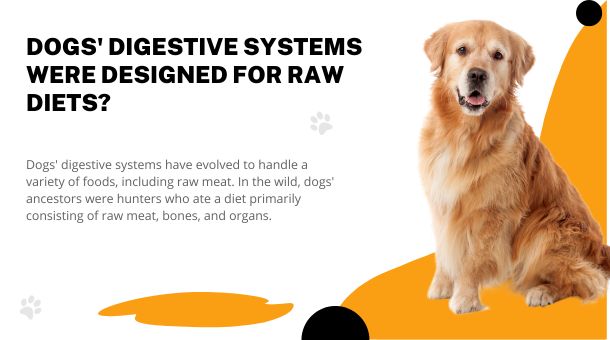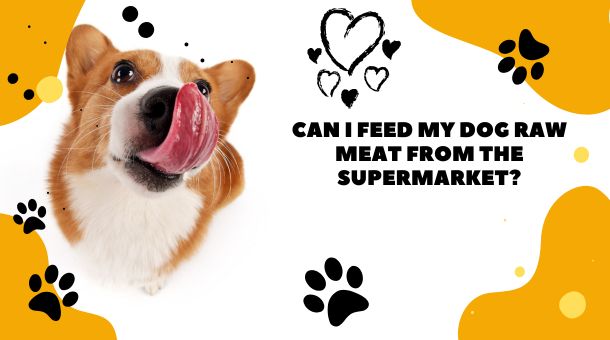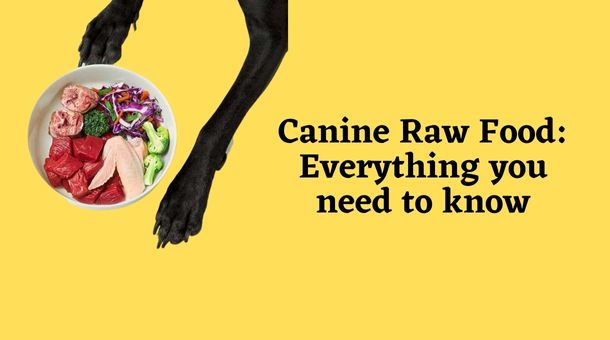Can I feed My Dog Raw Meat from the Supermarket?
Raw meat diets for dogs have become increasingly popular, with many pet owners opting for this feeding regimen.
However, there is some confusion and controversy surrounding the safety and nutritional value of feeding dogs raw meat, particularly regarding meat purchased from the Supermarket.
This article will explore whether feeding your dog raw meat from the Supermarket is safe, the potential benefits and risks, and what you need to know to ensure your dog’s diet is healthy and balanced.
Can I feed my dog raw meat from the Supermarket?
Feeding your dog raw meat from the Supermarket is a topic that has generated a lot of debate in the pet community. On the one hand, proponents of a raw meat diet for dogs argue that it can provide numerous health benefits, such as improved digestion, healthier skin and coat, and increased energy.
On the other hand, there are also potential risks associated with feeding your dog raw meat, particularly if the meat is purchased from a supermarket.
One of the primary concerns with feeding your dog raw meat from the Supermarket is the risk of bacterial contamination.
Raw meat can contain harmful bacteria such as Salmonella and E. coli, making your dog sick and even leading to serious health complications.
These bacteria can be particularly prevalent in supermarket meat, which may not have undergone the same rigorous testing and quality control measures as meat intended for human consumption.
Another issue to consider when feeding your dog raw meat from the Supermarket is the nutritional balance of their diet. While a raw meat diet can be healthy for dogs when done correctly, it’s important to ensure their diet is balanced and includes all the essential nutrients they need to thrive.
This can be difficult to achieve with raw meat alone, and many pet owners supplement their dog’s diet with other foods such as vegetables and fruits or specialized raw dog food blends.
If you’re considering feeding your dog raw meat from the Supermarket, it’s important to research and consults a veterinarian. They can help you determine whether a raw meat diet is appropriate for your dog’s specific needs and provide guidance on ensuring it is safe and nutritionally balanced.
It’s also important to practice good hygiene when handling raw meat, to minimize the risk of bacterial contamination for your pet and your family.

Nutrition Facts of Raw Beef:
Serving Size: 114g grams per Serving
- Calories 267
- Calories starting at Fat 176
- Total Fat 20ggrams31% Daily Value
- Saturated Fat 7.9ggrams40% Daily Value
- Polyunsaturated Fat 0.7gms
- Monounsaturated Fat 8.5ggrams
- Cholesterol 75mgmilligrams25%Daily Value
- Sodium 66mgmilligrams3%Daily Value
- Potassium 349mgmilligrams10%Daily Value
- Total Carbohydrates 0. ggrams0% Daily Value
- Daily Value 0ggrams of Dietary Fiber
- Sugars, 0g grams
- Protein 21ggrams
- 0%Vitamin A
- 0%Vitamin C
- 0.6%Calcium
- 12%Iron
Possible benefits of giving dogs raw meat:
Here are some of the possible benefits of giving dogs raw meat:
- Raw meat is a natural food source for dogs, mimicking their ancestral diet.
- Raw meat is highly palatable and may encourage picky eaters to consume more food.
- Some dogs with food allergies or sensitivities may benefit from a raw meat diet, as it eliminates many common allergens in commercial dog food.
- Raw meat is a good protein source for building and repairing tissue, maintaining healthy skin and coat, and supporting the immune system.
- Raw meat may contain higher levels of essential nutrients such as amino acids, vitamins, and minerals than commercial dog food, depending on the quality and source of the meat.
- Some dog owners report that their pets have more energy, better digestion, and improved overall health when fed a raw meat diet.
- The chewing and tearing required to eat raw meat can help keep dogs’ teeth and gums clean and healthy.
Possible risks from a raw meat diet:
- Bacterial contamination, including harmful bacteria such as Salmonella and E. coli
- The risk of bacterial infection increases when handling and storing raw meat
- The risk of bacterial infection is higher for dogs with compromised immune systems
- Nutritional deficiencies, including deficiencies in essential nutrients such as calcium, phosphorus, and vitamin D
- Risk of an unbalanced diet if the raw meat diet is not properly planned and supplemented with other necessary nutrients
- Potential for choking or blockages if bones are included in the raw meat diet
- Potential for pancreatitis if the raw meat diet is too high in fat
- Risk of transmitting bacterial infections to humans who handle the raw meat or come into contact with the dog’s feces.
What do You need to Know Before Feeding Your Dog Raw Supermarket Meat?
Feeding your dog raw meat from the Supermarket can be a risky and potentially dangerous practice.
Before making any changes to your dog’s diet, it’s crucial to understand the potential risks and benefits and take the necessary precautions to minimize the risk of bacterial contamination and other health problems.
Here’s what you need to know before feeding your dog raw supermarket meat:
Understand the risks:
Raw meat can contain harmful bacteria such as Salmonella and E. coli, posing a significant risk to your dog’s health. These bacteria can also be transmitted to humans who handle raw meat or come into contact with a dog’s feces. Handling and preparing raw meat safely is essential to minimize the risk of bacterial contamination.
Please consult with your veterinarian:
Before starting a raw meat diet, please consult your veterinarian to ensure it’s appropriate for your dog’s health and nutritional needs. Your veterinarian can also provide guidance on the proper handling and preparation of raw meat and suggest additional supplements or nutrients ensure your dog is receiving a balanced diet.
Choose high-quality meat:
When selecting raw meat for your dog, choose high-quality meat from reputable sources. Look for fresh, unprocessed meat, free of added hormones or antibiotics. Avoid meat that has been frozen and thawed multiple times, as this can increase the risk of bacterial contamination.
Handle and prepare the meat safely:
When handling and preparing raw meat, following proper food safety guidelines to minimize the risk of bacterial contamination is essential. Use separate cutting boards and utensils for raw meat and cooked food, wash your hands thoroughly before and after handling the meat, and clean all surfaces and utensils with hot, soapy water.
Monitor your dog’s health:
Keep a close eye on your dog’s health when transitioning to a raw meat diet. Watch for any signs of digestive upset, such as vomiting or diarrhea, and consult your veterinarian if you have any concerns. It’s also essential to monitor your dog’s weight and ensure they are maintaining a healthy body condition.
Dogs’ Digestive Systems Were Designed for Raw Diets?

Dogs’ digestive systems have evolved to handle a variety of foods, including raw meat. In the wild, dogs’ ancestors were hunters who ate a diet primarily consisting of raw meat, bones, and organs.
Over time, their digestive systems adapted to process these foods, and they developed specialized enzymes and gut bacteria to aid digestion.
Unlike humans, dogs have a shorter digestive tract, which allows them to digest raw meat and bones more efficiently. The acidity of their stomachs is also much higher, which helps to kill off harmful bacteria that may be present in raw meat.
Some proponents of raw meat diets for dogs argue that commercial dog food may contain unhealthy additives, such as preservatives and artificial flavors, that can harm dogs.
They claim that a raw meat diet can give dogs essential nutrients and enzymes lost in processing commercial dog food.
However, it’s important to note that a raw meat diet has risks. As mentioned earlier, raw meat can contain harmful bacteria such as Salmonella and E. coli, which can cause serious health problems in dogs and humans. It’s crucial to handle and prepare raw meat safely to minimize the risk of bacterial contamination.
Furthermore, not all dogs may be suited for a raw meat diet, particularly those with pre-existing health conditions. It’s important to consult with your veterinarian before significantly changing your dog’s diet.
How to Transition Your Dog to a Raw Supermarket Meat Diet Safely and Effectively?
Transitioning your dog to a raw supermarket meat diet can be done safely and effectively by following these steps:
- Before making any changes to your dog’s diet, it’s important to consult with your veterinarian. They can guide you on whether a raw meat diet is appropriate for your dog and how to meet its nutritional needs.
- Transitioning your dog to a new diet should be done slowly to avoid gastrointestinal upset. Start by introducing small amounts of raw meat into their diet and gradually increase them over 1-2 weeks.
- Choose high-quality meat from reputable sources to ensure it’s safe for your dog to eat. Look for meat free from antibiotics and hormones, and avoid meat close to its expiration date.
- A raw meat diet should be balanced to ensure your dog gets all the necessary nutrients. This includes a variety of meat, bones, and organs, as well as fruits and vegetables.
- Keep a close eye on your dog’s health while transitioning to a raw meat diet. Look out for any signs of gastrointestinal upset or nutrient deficiencies, and adjust the diet as necessary.
- Raw meat can be contaminated with harmful bacteria, so it’s important to practice safe handling and preparation. This includes storing meat separately from other foods, washing hands and surfaces thoroughly, and cooking meat to a safe temperature.
FAQ Section:
Can raw meat cause health problems for dogs?
Raw meat can cause dog health problems, such as bacterial infections, nutrient imbalances, and blockages from bones or other indigestible materials.
How can I ensure my dog gets all the nutrients they need on a raw meat diet?
To ensure your dog gets all the nutrients they need on a raw meat diet, it’s important to choose a variety of meats, including some organic meat, and consider supplementing with vitamins and minerals as needed. Consulting with a veterinary nutritionist can also be helpful.
Can all dogs safely eat raw meat?
Not all dogs can safely eat raw meat, as individual health conditions or other factors may make a raw meat diet inappropriate for some dogs. It’s important to consult with a veterinarian before making any dietary changes.
Can puppies eat raw meat?
Puppies can eat raw meat, but ensuring their diet is balanced and meets their nutritional needs is important. Consulting with a veterinarian is recommended.
Is it safe to handle raw meat when preparing meals for my dog?
Raw meat can be potentially contaminated with harmful bacteria, so practicing safe handling is important when preparing meals for your dog. This includes washing your hands thoroughly after handling raw meat, using separate utensils and cutting boards, and storing meat properly to prevent contamination.
Conclusion
feeding your dog raw meat from the Supermarket can be controversial and potentially risky, but it can also have potential benefits when done properly. It’s important to weigh the pros and cons and make an informed decision, considering your dog’s health needs and consulting with a veterinarian.
If you decide to feed your dog a raw meat diet, it’s crucial to do so safely and effectively, transitioning them gradually and ensuring they receive all the necessary nutrients. With the right approach, a raw meat diet can provide your dog with a healthy and balanced source of nutrition.
Can I feed My Dog Raw Meat from the Supermarket? Can I feed My Dog Raw Meat from the Supermarket Can I feed My Dog Raw Meat from the Supermarket? Can I feed My Dog Raw Meat from the Supermarket Can I feed My Dog Raw Meat from the Supermarket? Can I feed My Dog Raw Meat from the Supermarket? Can I feed My Dog Raw Meat from the Supermarket Can I feed My Dog Raw Meat from the Supermarket
Can I feed My Dog Raw Meat from the Supermarket? Can I feed My Dog Raw Meat from the Supermarket? Can I feed My Dog Raw Meat from the Supermarket? Can I feed My Dog Raw Meat from the Supermarket?




